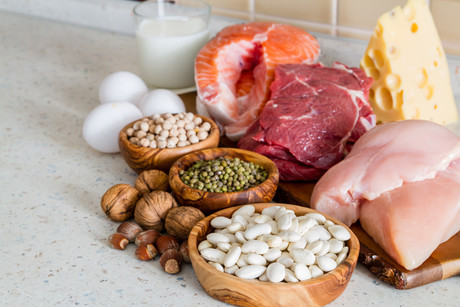High-protein diet lowers Alzheimer's risk

Eating protein-rich foods such as meat, legumes and peanuts reduces the risk of developing Alzheimer’s disease, according to new research from Edith Cowan University.
Researchers from ECU’s School of Medical and Health Sciences examined the diets of 541 Australians and measured the levels of amyloid beta (Aβ) in their brain, which is a precursor to Alzheimer’s disease.
They found that participants with higher levels of protein in their diet were less likely to have high levels of Aβ in their brain, reducing their risk of developing Alzheimer’s disease.
Brain boost
The participants were divided into three groups based on their protein intake.
They found that those with the highest consumption, around 118 g per day, were 12 times less likely to have high levels of Aβ than those in the lowest consumption group, who ate only 54 g per day.
Lead researcher Dr Binosha Fernando said this was the first ever study to examine the relationship between protein consumption and Aβ.
“The research clearly demonstrates that the more protein eaten the lower the chances someone has of having a high Aβ burden on the brain, which corresponds to a lower risk of developing Alzheimer’s in the future,” she said.
Looking for a link
Dr Fernando said it was still unknown what was driving the relationship between high protein intake and low Aβ.
“One possibility is that previous studies have shown that a high-protein diet is associated with lower blood pressure,” she said.
“High blood pressure is a risk factor for both Alzheimer’s disease and cardiovascular disease. We also know that developing cardiovascular disease increases your risk of developing Alzheimer’s disease.”
Dr Fernando said the next step was to further examine what role gender, genetics, age and metabolic factors play in the relationship between protein consumption and Alzheimer’s disease.
Getting enough protein
Protein is found in animal products like beef, pork, lamb, eggs, fish and poultry, as well as in plant-based foods like legumes, whole grains, nuts and seeds.
Amount of protein per 100 g in common foods:
- Chicken: 30 g
- Beef (steak): 26 g
- Tuna (Bluefin): 30 g
- Lentils: 10 g
- Pinto beans: 20 g
- Peanuts: 26 g
- Milk: 3.4 g
- Cheese (cheddar): 25 g
Source: US Department of Agriculture
“To get the protective effect that we have demonstrated, you need to be eating about 120 g of protein each day, which isn’t too hard,” Dr Fernando said.
“For example, if you had a mixed bean and tuna salad for lunch, 100 g of chicken and salad for dinner, and snacked on a handful of peanuts during the day, you would be getting very close to enough protein to lower your chances of having a high Aβ burden in your brain.”
‘Associations of Dietary Protein and Fiber Intake with Brain and Blood Amyloid-β’ was recently published in the Journal of Alzheimer’s Disease.
Originally published here.
AFGC reviews progress on food and grocery manufacturing targets
In its latest food and grocery manufacturing sector report, AFGC reflects on the...
$15m AI space project to help boost Australian agriculture
The Australasian Space Innovation Institute is developing an AI-enabled geospatial national...
Barry Callebaut opens chocolate innovation centre in Singapore
The Callebaut Global Innovation Center is helping to advance the future of chocolate and cocoa...











